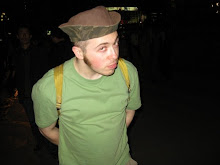The first post in what I hope will be a year-long blog of my Year Abroad experience - here I answer the question I get asked not most, but quite a lot ... "Why on earth are you choosing to study in Urumqi???"
Choosing was based on personal preference versus available spaces at the host universities. Where this process was concerned, the main problem was its speed (or relevant lack thereof) and the onus on students as a group to sort out themselves and their destinations. If you have no prior knowledge of China, then the choice of 6 different universities could seem quite daunting. Information and Year Abroad (YAB) meetings came quite late into the year, as did finalising choices; with hindsight I can now say that everything has worked out okay, everyone knows where they are going and most people have received paperwork from the host institutions. But be prepared to feel like the SML is taking their time! As for how to choose, your opinions, personal experience, likes (and dislikes!), and ability to handle interesting / new / different situations will all affect your final decision, but here's how I came to mine (the six institutions are Beijing, Shanghai, Chongqing, Chengdu, Haikou and Urumqi):
* I lived in Shanghai for a month on my GAP year, and found that while it is in China it is not terribly Chinese. No one really stared at you (something Chinese will do when something / someone is interesting or strange to them) which is a good measure of how urban the place is! Not to mention the pollution and size of the city (circa 20 million people) - I quickly grew to dislike Shanghai, so that was automatically ruled out.
* As the capital, Beijing is heralded as a political and cultural hub, and the quality of the Chinese spoken there is second to none. Indeed, 北京话 (beijinghua, or Beijing Dialect) is standard across China, in a fashion similar to Queen's English - or what it would be if everyone in England was taught to speak "correctly" rather than in their regional accents / dialects. For a linguist, studying at the Beijing Cultural and Language University (BCLU) would be a dream. However, I have been to Beijing, and my opinion was quite jaded by the dreary weather (it was February), the smog and pollution, the masses of concrete (Tiananmen Square is just a large concrete plaza), not to mention its proximity (as with Shanghai) to the sea, giving its summers a propensity for humidity - all these lined up to rule out Beijing.
* Haikou is based on the island of Hainan, south of the Chinese mainland. It is like Florida in terms of climate, but with (I think) more monsoons. It is humid in the extreme - and yes, your accommodation might come with internet included, and air conditioning units, but it is likely I would never want to leave my room, and that both of these things would become a necessity rather than a luxury.
* Moving away from the sea, the cities of Chongqing and Chengdu are both located in Sichuan province. The main problem I have with Sichuan province is not the geology (it was recently the centre of a whopping earthquake), but the food. People belittle my reasoning here, but Sichuan food is spicy. I cannot handle more than a korma, and certainly not any chilli dishes - a recent excursion to a well-known Japanese restaurant proved this when my girlfriend offered me a slice of chilli and I foolishly accepted. It is likely that I would be eating three times a day (minimum), which amounts to approximately 1000 meals during my time in China. To feel upset and discomfort one thousand times in the course of a year is not something I want to remember from my YAB.
* Finally, we are left with Urumqi (Wulumuqi) - a landlocked city, 2000km from the nearest sea, where the summers are hot and dry, and the winters are exceedingly cold (average of -15C). A city which, though heavily industrialised, is only a short journey from stunning views (the Tianshan mountain range runs south of the city, and Heavenly Lake is so close that when it freezes over in winter I am told people go en masse to skate on it). A city where the options for local travel are not to the traditional Asian destinations of South Korea, Vietnam or Japan, but the more untouched countries of Kazakhstan, Kyrgyzstan, Mongolia and parts of Siberia (Russia). Yes, I am biased. But the city seems perfect for me, given the aforementioned choices - it is only 2 million people in size, it has a national ethnic minority (more on them in a later post), an ethnic language by default, and I will be forced to use my Chinese to communicate because English speakers are few and far between. Oh, and it's cheap as chips.
So, my advice to students who are given a range of options, but not much information, and are forced to make a relatively fast decision - get together quickly (use Facebook, set up a group to discuss issues), and then get your heads into some books or pick the brains of people who have either been to China and returned (fourth year students) or those of us out there. Read as much as you can, and ask as many questions as you can, because nothing is a stupid question - if you arrived in Chongqing and didn't like chilli but had neglected to ask, you might find yourself in for a horrible year.
(If anyone wants to contact me regarding Urumqi, please feel free. Either leave a comment on my blog or email me at h.l.joseph@ncl.ac.uk)

No comments:
Post a Comment